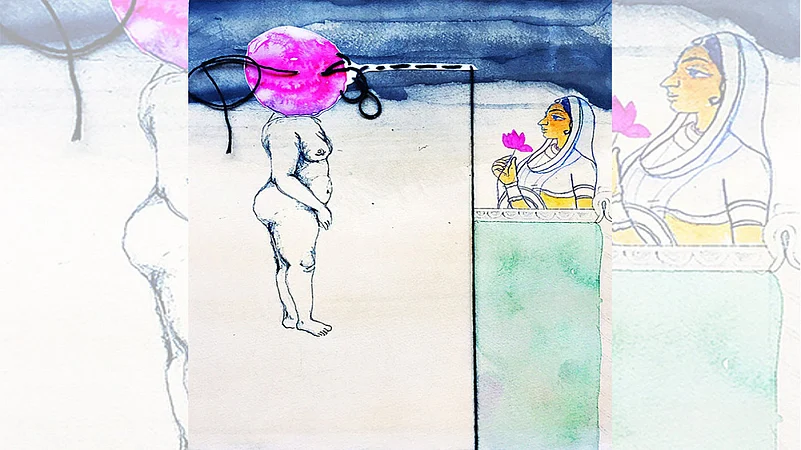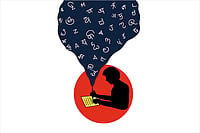The cornerstone of our social, cultural and political apparatus rests on legitimising biological reproduction. In India, the family is largely a hegemonic institution wherein men enjoy both religious and cultural entitlements. Needless to say, the family ascendancy reduces the agency of individuals when it comes to negotiating marriage or even reproduction. The most popular blessing in India for heterosexual couples getting married is: “May you be the mother of a hundred sons.” This foregrounds the primary role and social status of marriage in the popular imagination.
Presumably, there is a right age to get married with a ‘suitable’ partner (same caste/gotra/religion). Immediately afterwards, announcement of the ‘good news’ is awaited eagerly by immediate and extended family. Any delay would warrant numerous visits to faith healers and doctors who can work magic. For women, begetting sons will cement their credentials within the family space, while for men, it means an heir to inherit their wealth and family pride. Among Hindus, they also help smoothen their passage to the next world. Despite the gains ushered in by modernity, sons provide social security to parents. Our popular culture, myths and legends are replete with such stories.
No wonder then that infertility is considered a curse in our child-infatuated society. Invariably, women are blamed for ‘failing’ to produce an heir. Thankfully, for those with deep pockets, science and technology is facilitating pro-natalist hegemony. Now there is an entire spectrum of infertility treatments which supposedly guarantee babies of specific gender, colour and even number.
In a son-obsessed society like India, such techniques are really a blessing. For more desperate families, there is always a Vicky Donor. The sperm and egg are chosen with care—IIT/Brahmin sperms are in high demand. In a country where laws are always tweaked and tampered for one’s personal gains, it is easy to hire a poor woman’s body to bear their preferred child. This is a new form of labour ushered in by globalisation.
Though marriage, parenthood and kinship are psycho-social constructs, in the Indian context, deviating consciously from established cultural norms leads to unpleasant questions. However, modern jurisprudence is also creating parenthood in new ways, such as via adoption. Often people adopt from within the extended family so that the caste honour and pride is left intact, which is accepted by wider society. But the authors decided to take the legal route for adoption.
The first step for the authors was to contact various agencies who were authorised by the State to conduct legal adoptions. We were surprised that no agency was ready to register our names as prospective adoptive parents despite holding government jobs with a regular income. We were asked to undergo a battery of psychological and physical tests to establish our fitness to be ‘parents’. On the flip side, it also revealed the fact that there is something ‘wrong’ with us that we need to resort to such desperate measures. As we belonged to different caste/regional backgrounds, the apprehensions of the extended family also differed. One side was concerned about the gender and skin-colour of the child, while the other side was thinking about the post-adoption scenario—how the child will be accepted. What was really heartwarming was that our colleagues/friends really supported our decision. Gradually, the families also welcomed the idea.
Our preference was for a baby girl, but all agencies in Delhi stated that registrations were closed. Finally, we managed to register with an agency in South India. As we were based in Delhi, we approached a local politician who helped us in registering with a local institute. The entire procedure was very unfriendly with no answers as to when the adoption process will be completed. Every phone call from us would be fobbed off with the response: “Your turn is yet to come and we will let you know.” After a while, we filed an RTI with CARA (Central Adoption Resource Authority), which only gave us partial information. Armed with these responses, we approached the Delhi State Women and Child Welfare Department for necessary action. Only after we hinted to them that we would go to press with the entire story did they caution the agency to speed-track our file. This was also the time when Baby Falak’s case was in the news.
Once the agency came for home study, things moved very fast and soon, we could bring a baby girl home as per our preference. However, the patriarchal nature of the legal process was reflected in the manner in which the entire adoption process unfolded. After a few years, we thought of adopting another child so that our daughter will have a sibling. But the rules had changed and the process had turned more cumbersome. In the digitalised version, we can choose the gender of the child and even the region from where to adopt.
But the rules regarding age were a big stumbling block. Now, the age of the child to be adopted depended on the age of the parents. This is ironical as one can opt for surrogacy or assisted reproductive techniques without any age barriers. By this rule, we could only adopt a child who is senior to our daughter, which would only lead to further complications within the family. Within a month, the prospective parents are supposed to make up their minds, medically examine the child etc, which proves detrimental to the entire process.
We raised our concerns about the new adoption rules and procedures to the concerned ministry/department, but our efforts were in vain. We got tired of questioning the bureaucracy regarding these unfriendly norms. The laws must be very flexible to facilitate more adoptions in a scenario wherein even embryos are sold in many fertility centres.
CARA’s own data reflects that age is a major barrier in the adoption process, as smaller children bond easily with the adoptive family and language is not a barrier. Our daughter is fluent in four languages and is learning a fifth one. Even maternity leave is granted only if the adopted child is below one year of age, as if older children do not need any time for emotional bonding.
The pandemic has made children more vulnerable to all kinds of abuse, and the State needs to ensure a healthy and protective environment for them. CARA needs to move beyond its empty slogans and initiate a dialogue with wider society so that adoption becomes a more hassle-free experience. The bureaucratic procedures, filing of various forms in triplicate, tax records, movable and immovable assets, salary certificates and blood reports, including HIV reports, tend to criminalise prospective adoptive parents.
We also needed to provide photographs of our home to the agency. On the contrary, surrogacy and ART (Assisted Reproductive Technology) are acceptable to society and are also incentivised by the medical fraternity. The final straw was the lawyer asking for a sterility certificate from the adoptive mother to complete the adoption in the civil/family court. This is not required from the father. In a scenario where even single women can adopt, such misogynistic mindsets create more bottlenecks in the adoption process.
(This appeared in the print edition as "Paternitas Interruptus")
(Views expressed are personal)
ALSO READ























